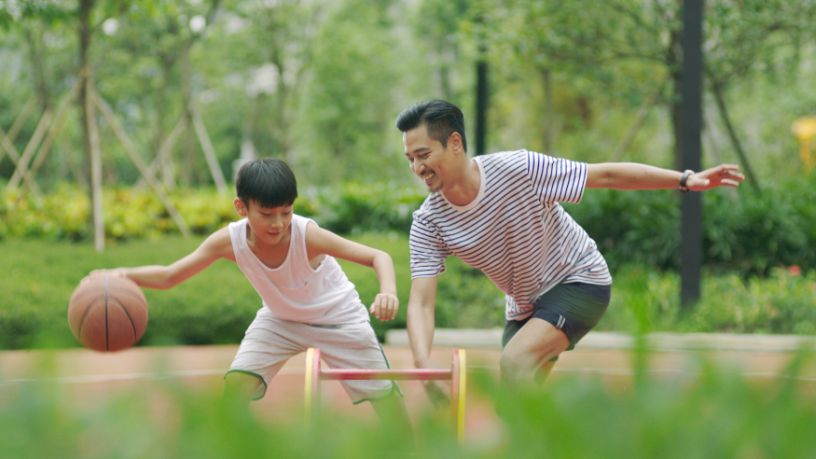Knee reconstruction is a common surgery in Australia, performed under general anaesthetic.
On this page
Key takeaways
Exercise before and after surgery is vital to help you recover as quickly as possible.
A physiotherapist can help guide your rehabilitation and make your recovery journey easier.
What is knee reconstruction?
A knee reconstruction is an increasingly common surgery to repair a torn or ruptured ligament in the knee. It’s usually performed due to a tear in the anterior cruciate ligament (ACL), the fibrous tissue that helps to stabilise your knee, but can also be a tear in the posterior cruciate ligament (PCL), medial collateral ligament (MCL) or lateral collateral ligament (LCL).
ACL tears are a common knee injury, particularly in people under 25. More than 70% of ACL injuries happen while playing sports like netball, rugby and soccer, often from twisting or landing badly.1
Not everyone who injures or tears their ACL will need reconstructive surgery. Depending on your lifestyle and goals, a physio program of strength, balance and mobility exercises may be enough to help you return to the activities you enjoy.
Your treating team is likely to recommend surgery if you:
- want to return to high-level pivoting sports
- have other knee damage like a meniscal tear
- have a persistent feeling of instability despite rehabilitation therapy.
Preparing for knee reconstruction
If your knee joint is too swollen after injury, your surgeon may recommend waiting for the swelling to go down before operating. During this time, you may be given some exercises and physiotherapy. This is your prehabilitation (prehab), or pre-surgery program, which is important for post-surgery recovery.
Other ways you can prepare for surgery include:
- Stop smoking and drinking alcohol if possible. Stopping smoking at least 8 weeks before surgery can significantly reduce your risk of serious complications during and after surgery.2
- Start your prehab as soon as possible after your injury and think of it as part of your injury recovery process. It will help to get your leg as strong and functional as possible.
- See your GP to discuss any ongoing medical conditions. You might need to stop some medications before surgery, such as anti-inflammatory medication and blood thinners.
- Maintain a healthy diet and weight.
- Ask family and friends if they can help you with daily tasks after your surgery.
What to expect during surgery
Most ACL surgeries take around 90 minutes and are performed under a general anaesthetic, so you won’t be awake during the surgery. They are generally performed as day procedures, and most people can go home that day.
A knee reconstruction is performed by taking a strip of tendon, usually from around your knee (hamstrings, quadriceps or patella), and creating a new ligament out of it. This can be done with either an open or keyhole procedure, depending on what your surgeon has recommended for you.
Immediately after surgery
Within a few hours of surgery, you should be out of bed and walking with crutches. There are a few reasons for this.
- It’s important for your overall lung and heart function to move as soon as possible after a general anaesthetic.
- It’s good for your knee recovery, to help you maintain strength and movement.
Depending on your knee injury and the type of knee reconstruction surgery, you may need a hinged knee brace to limit your knee movement and allow your knee to heal. Make sure you follow the advice of your surgeon and don’t overdo it.
You may have some pain post-surgery. While it might be tempting to push through, managing your post-operative pain by following your surgeon's advice is important so that you don't compromise your recovery.
Risks and complications of knee reconstruction surgery
Complications can occur with any surgery. These could include an unexpected reaction to the anaesthetic, excessive bleeding, infection or developing a blood clot after the surgery.
After knee reconstruction surgery, it’s possible to develop knee stiffness due to scarring inside the joint. It’s also possible that you could experience ongoing pain, swelling or joint instability. These complications are more likely if the initial injury had caused damage to other parts of your knee.
As well as these physical risks, your surgery and rehabilitation process may take a toll on your mental health. It’s important to have some support as you recover and people around you who can help make life easier.
Are you in need of urgent support?
We've put together a list of services for free support that's relevant to where you live, and what you're going through.
Recovering from knee reconstruction surgery
Rehabilitation
Rehabilitation is as important to your final outcome as the surgery itself. It’s important to follow your surgeon’s advice and see a physiotherapist. Targeted rehabilitation with an ACL-rehabilitation-trained physiotherapist may help get you better outcomes without compromising your recovery. This means that you are better placed to return to the activities you love.
Your physiotherapist will guide you through exercises to help you build up your range of motion, strength and dynamic control of the knee. Your rehabilitation plan will change over time as you get stronger and as your knee can handle more challenging movements.
Support at home
Having support structures at home can also make a difference. Before your surgery, you could pre-make meals for the freezer and prepare your home environment so that essentials are easy to access. There are aspects of normal life that can be challenging in the weeks after surgery, like walking the dog or fetching groceries. Line up some support where you can.
If you don't have access to a support network that can help during this time, try looking into local support services.
It’s important you don’t compromise your recovery by doing too much, too soon.
Risk of further knee surgeries
If your reconstruction is successful, the likelihood of future knee surgery is low. But there is a risk of a potential rupture, especially if you return to sport too quickly. Your physiotherapist will be able to test your readiness and let you know when you’re safe to go back on the field.
It’s normal to have concerns or questions before any surgery. Make sure you have an honest conversation with your treating team and ask all the questions you need to. Playing an active role in your healthcare will result in bigger benefits and help speed up your recovery.
Need some advice?
Call us on 1300 030 238 (Mon-Fri, 9am-5pm AEST) to speak with one of our health professionals or register for a call back to find out what programs are available to you.
Resources
Musculoskeletal Health Australia provides information and support for people living with arthritis and musculoskeletal conditions. Visit their website or call them on 1800 263 265.
Pain Australia works towards improving the quality of life for those living with pain. Visit their website for resources and support, including their National Pain Services Directory.
NSW Government Health’s Patient Roadmap is a handy step-by-step guide to preparing for and recovering from surgery.
The Australian Physiotherapy Association can help you find a physio near you.

At Bupa, trust is everything
Our health and wellbeing information is regularly reviewed and maintained by a team of healthcare experts, to ensure its relevancy and accuracy. Everyone's health journey is unique and health outcomes vary from person to person.
This content is not a replacement for personalised and specific medical, healthcare, or other professional advice. If you have concerns about your health, see your doctor or other health professional.
1Zbrojkiewicz, D., Vertullo, C., & Grayson, J. (2018). Increasing rates of anterior cruciate ligament reconstruction in young Australians, 2000-2015. The Medical Journal of Australia, 208(8), 354-358.
2Queensland Government, Queensland Health. (2014). Smoking and surgery factsheet. Queensland Government, Queensland Health.
You might also like...
5 best exercises to strengthen your knee after surgery
If you’ve had knee surgery, support your recovery with these 5 physiotherapist-approved exercises. Regain strength and mobility safely at home.
What happens after an ACL injury?
An ACL injury can be painful, and may require medication, physiotherapy and even surgery. Get to know your options.
7 things I wish I knew before knee surgery
Knee surgery is a major operation that may require months of intensive recovery. Discover 7 common insights from those who’ve done it.
Knee pain: A basic guide
Your knees are the largest joints in your body. They’re also among the most accident prone. Get to know the basics of knee pain.





